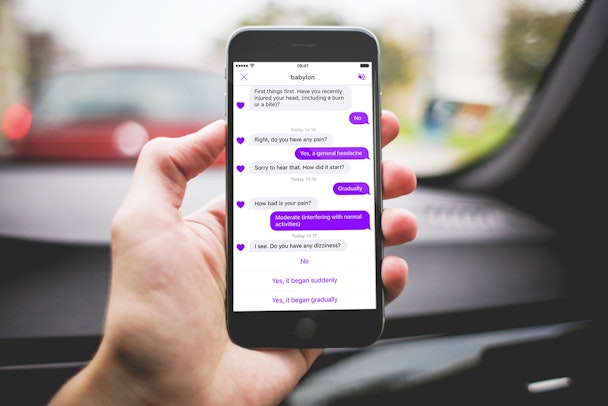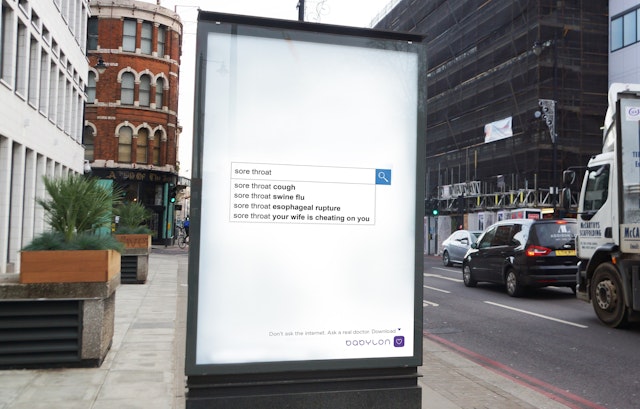The AI doctor will see you now: How Babylon is getting people to trust a chatbot
Convincing people to let artificial intelligence diagnose them is no mean feat and yet healthcare app Babylon believes it can be done if its marketing stresses the technology won’t replace doctors but rather amplify their proficiency.

How Babylon is getting people to trust a chatbot.
Strong brand awareness is key to establishing the free to download app that triage patients without human intervention based on reported symptoms as well as offer video consultations for a monthly fee or one-off payment.
Should its marketing prove successful then those behind the app believe its first campaign in the UK could pave the way for the brand’s name to become inextricably linked to virtual appointments in the same way Google is to search or Uber to ordering a taxi. What Babylon doesn’t want to be known for is the app that tried to replace doctors, which could be too big a leap for many people who likely have strong affinity for the NHS.
If Babylon is to become the Airbnb or Uber of healthcare, then its marketing must be as much about behavioural change as it is building awareness; Airbnb is still just booking a hotel room, while Uber is still ordering a taxi, though both have successfully identified a behavioural change that they can nudge. For Babylon, this behavioural change is the rise of people prepared to trust search engines to accurately diagnose their symptoms.
Working with Ogilvy & Mather, Babylon opted to target a younger demographic that feel they have time to see the doctor and are more inclined to ask (a medically inaccurate) Google rather than a doctor about suspicious symptoms. The ads play on the absurdity of this idea, with a search box featuring a humorous query such as “Hangover…did you mean liver transplant?” or “Headache…did you mean brain tumor?”, before asking the viewer “Don’t ask the internet, ask a real doctor”.
Its marketing strategy going up against centuries of doctor/patient understanding that’s meant some people feel better just by having been to see their GP. However, the majority (85%) of these visits don’t need to happen in the first place, according to Babylon, spotlighting how medical AI could save the NHS from a looming shortfall when it costs someone just half the amount (£5) to see a doctor via the Babylon app than it would if they were to visit their GP.

Unsurprisingly, a creaking NHS sees services like Babylon as a way to bring speed and awareness to healthcare; in what can be seen as a badge of approval, the health service is testing the medical app over the next six months as an alternative to NHS 111, the non-emergency helpline. It’s not quite diagnosis by AI yet (although that is coming) but it does serve as the easiest way to talk about a service that could potentially cheapen the most expensive part of healthcare – the human being.
‘We thought about mentioning the partnership with the NHS as part of the messaging mix but the problem is everyone knows what it represents but no one knows about Babylon,” admitted Kevin Chesters, chief strategy officer at Ogilvy & Mather London of the brand’s softly, softly approach. In essence, it is trying to resist the temptation to rely on the NHS’s seal of approval to win people over and bombard them with product information.
As altruistic as Babylon’s edict sounds, there’s the possibility that it could also exacerbate fears of a two-tiered system for national health, dividing those people that can afford a faster premium service and those that cannot. However, the service’s founder and chief executive Dr Ali Parsa sees its role as one of support rather than a risk.
“Our vision at Babylon is to put an accessible and affordable health service into the hands of everyone on earth,” she said. “In the UK that means working closely with the NHS to provide Babylon’s technology where it is needed most – to alleviate pressures on GP’s and other primary and pre-primary care services, and also to provide patients with greater choice and convenience around how they access health services.”
Having such a tailored message would mean nothing Babylon’s media strategy can’t get it in front of those people likely to download the app. Mindful that it must do this on a modest budget, the healthcare app has taken the unusual step of focusing on frequency over the traditional big impact outdoor tactics around two London boroughs - Hackney and Southwark.

To narrow its focus further, Babylon’s media agency PHD Media worked out that of the 3.1 million 20 to 39 year-olds living in London, some 2 million lead typically connected lifestyles, whether it’s using Uber-type apps or accessing the internet from their mobile phone. Both are fairly generic statements in the modern age but the most relevant the agency could find to give it large enough reach, said Fergus Barnett, business director at PHD Media.
It then mapped this audience against those boroughs that had the highest penetration before looking at which areas had the best media inventory to activate the campaign. The Overground line made Hackney look even more attractive for this reason. Barnett and his team worked back from the Overground stations and focused on major arteries into the stations or into town all the while not forgetting a chunk of its audience in Dalston will cycle into work.
“The idea in our site mapping was that however the target audience got into work they would struggle to miss our TCPs on the Overground, 6s, 48s and large dominating formats like Blow-Up’s Kingsland Rd,” explained Barnett. “With multiple executions running the ads should become recognisable as frequency builds and each should resonate that bit more.”
What’s more, for some locations the creative has been picked with its surroundings in mind; someone leaving a restaurant may see an ad that cites stomach pains as a reason for using Babylon, for example.
“Before any of this technology existed there was Bupa, which was always seen as being the big evil one in comparison to the crown jewel that is the NHS. However, things like Bupa can actually work with the NHS and in this instance of Babylon it could save the NHS a fortune,” said Chesters of a shift toward more proactive rather than reactive healthcare that Babylon wants to be a major part of.
“85% of consultations don’t need to be in person. That’s not to discredit value of the NHS because will still need the service. But imagine that 85% of people switch to Babylon, all of a sudden that really strained budget at the NHS gets freed up. You can spend it on the people who need to be seen.”

